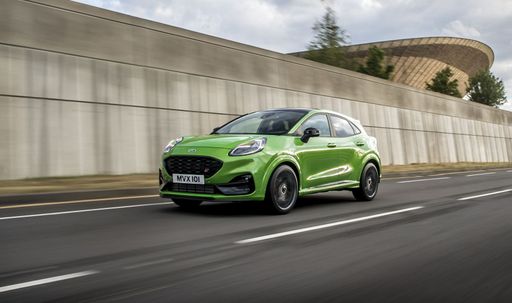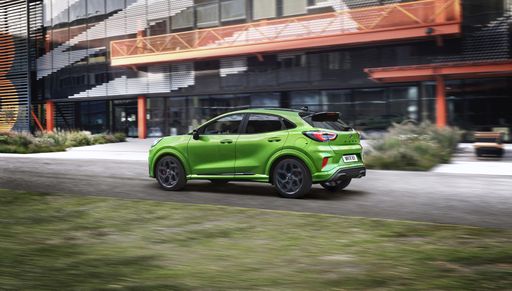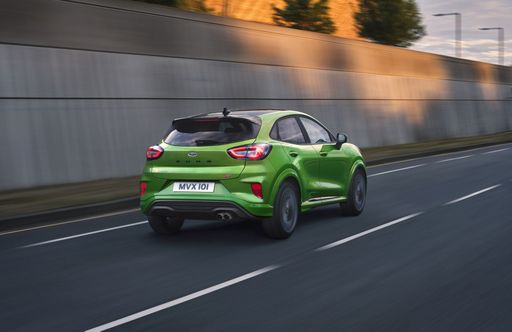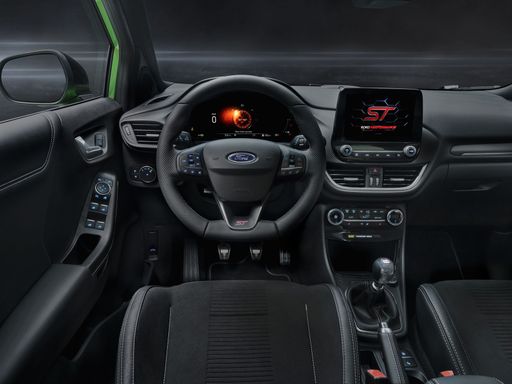Ford Puma vs Hyundai Bayon - Differences and prices compared
Compare performance (168 HP vs 90 HP), boot space and price (24800 £ vs 20100 £ ) at a glance. Find out which car is the better choice for you – Ford Puma or Hyundai Bayon?
Costs and Efficiency:
Price and efficiency are key factors when choosing a car – and this is often where the real differences emerge.
Hyundai Bayon has a noticeable advantage in terms of price – it starts at 20100 £ , while the Ford Puma costs 24800 £ . That’s a price difference of around 4714 £.
Fuel consumption also shows a difference: Ford Puma manages with 5.40 L and is therefore hardly perceptible more efficient than the Hyundai Bayon with 5.80 L. The difference is about 0.40 L per 100 km.
Engine and Performance:
Power, torque and acceleration are the classic benchmarks for car enthusiasts – and here, some clear differences start to show.
When it comes to engine power, the Ford Puma has a significantly edge – offering 168 HP compared to 90 HP. That’s roughly 78 HP more horsepower.
In acceleration from 0 to 100 km/h, the Ford Puma is clearly quicker – completing the sprint in 7.40 s, while the Hyundai Bayon takes 11.90 s. That’s about 4.50 s faster.
There’s also a difference in torque: Ford Puma pulls significantly stronger with 290 Nm compared to 172 Nm. That’s about 118 Nm difference.
Space and Everyday Use:
Cabin size, boot volume and payload all play a role in everyday practicality. Here, comfort and flexibility make the difference.
Both vehicles offer seating for 5 people.
In curb weight, Hyundai Bayon is to a small extent lighter – 1175 kg compared to 1316 kg. The difference is around 141 kg.
In terms of boot space, the Ford Puma offers noticeable more room – 523 L compared to 411 L. That’s a difference of about 112 L.
When it comes to payload, Ford Puma minimal takes the win – 469 kg compared to 460 kg. That’s a difference of about 9 kg.
Who wins the race in the data check?
The Ford Puma is far ahead overall in the objective data comparison.
This result only shows which model scores more points on paper – not which of the two cars feels right for you.
Costs and Consumption
View detailed analysis
Engine and Performance
View detailed analysis
Dimensions and Body
View detailed analysis

Ford Puma
Ford Puma
The Ford Puma is a cheeky compact crossover that blends sporty styling with city-friendly practicality, giving drivers a surprisingly fun and composed ride. With clever storage tricks and a lively personality, it’s a smart pick for buyers who want enjoyment without fuss.
details



Hyundai Bayon
The Hyundai Bayon slips neatly between city runabout and small SUV, offering surprising practicality and a fresh, confident design that stands out in urban traffic. It's an easy buy for shoppers who want smart packaging, tidy handling and a dash of personality without fuss — a sensible little crossover that makes everyday driving a bit more enjoyable.
details




Costs and Consumption |
|
|---|---|
|
Price
24800 - 36300 £
|
Price
20100 - 25800 £
|
|
Consumption L/100km
5.4 - 5.9 L
|
Consumption L/100km
5.80 L
|
|
Consumption kWh/100km
13.1 - 13.9 kWh
|
Consumption kWh/100km
-
|
|
Electric Range
361 - 376 km
|
Electric Range
-
|
|
Battery Capacity
43 kWh
|
Battery Capacity
-
|
|
co2
0 - 135 g/km
|
co2
130 - 132 g/km
|
|
Fuel tank capacity
42 L
|
Fuel tank capacity
-
|
Dimensions and Body |
|
|---|---|
|
Body Type
SUV
|
Body Type
SUV
|
|
Seats
5
|
Seats
5
|
|
Doors
5
|
Doors
-
|
|
Curb weight
1316 - 1563 kg
|
Curb weight
1175 - 1200 kg
|
|
Trunk capacity
456 - 523 L
|
Trunk capacity
411 L
|
|
Length
4186 - 4226 mm
|
Length
-
|
|
Width
1805 mm
|
Width
1775 mm
|
|
Height
1550 - 1555 mm
|
Height
-
|
|
Max trunk capacity
1216 - 1283 L
|
Max trunk capacity
-
|
|
Payload
367 - 469 kg
|
Payload
450 - 460 kg
|
Engine and Performance |
|
|---|---|
|
Engine Type
Electric, Petrol MHEV
|
Engine Type
Petrol
|
|
Transmission
Automatic, Manuel
|
Transmission
Manuel, Automatic
|
|
Transmission Detail
Reduction Gearbox, Manual Gearbox, Dual-Clutch Automatic
|
Transmission Detail
Manual Gearbox, Dual-Clutch Automatic
|
|
Drive Type
Front-Wheel Drive
|
Drive Type
Front-Wheel Drive
|
|
Power HP
125 - 168 HP
|
Power HP
90 HP
|
|
Acceleration 0-100km/h
7.4 - 9.8 s
|
Acceleration 0-100km/h
11.9 - 13.3 s
|
|
Max Speed
160 - 210 km/h
|
Max Speed
-
|
|
Torque
170 - 290 Nm
|
Torque
172 Nm
|
|
Number of Cylinders
3
|
Number of Cylinders
3
|
|
Power kW
92 - 124 kW
|
Power kW
66 kW
|
|
Engine capacity
999 cm3
|
Engine capacity
998 cm3
|
General |
|
|---|---|
|
Model Year
2025
|
Model Year
2025
|
|
CO2 Efficiency Class
A, D
|
CO2 Efficiency Class
D
|
|
Brand
Ford
|
Brand
Hyundai
|
Is the Ford Puma offered with different drivetrains?
The Ford Puma is offered with Front-Wheel Drive.




